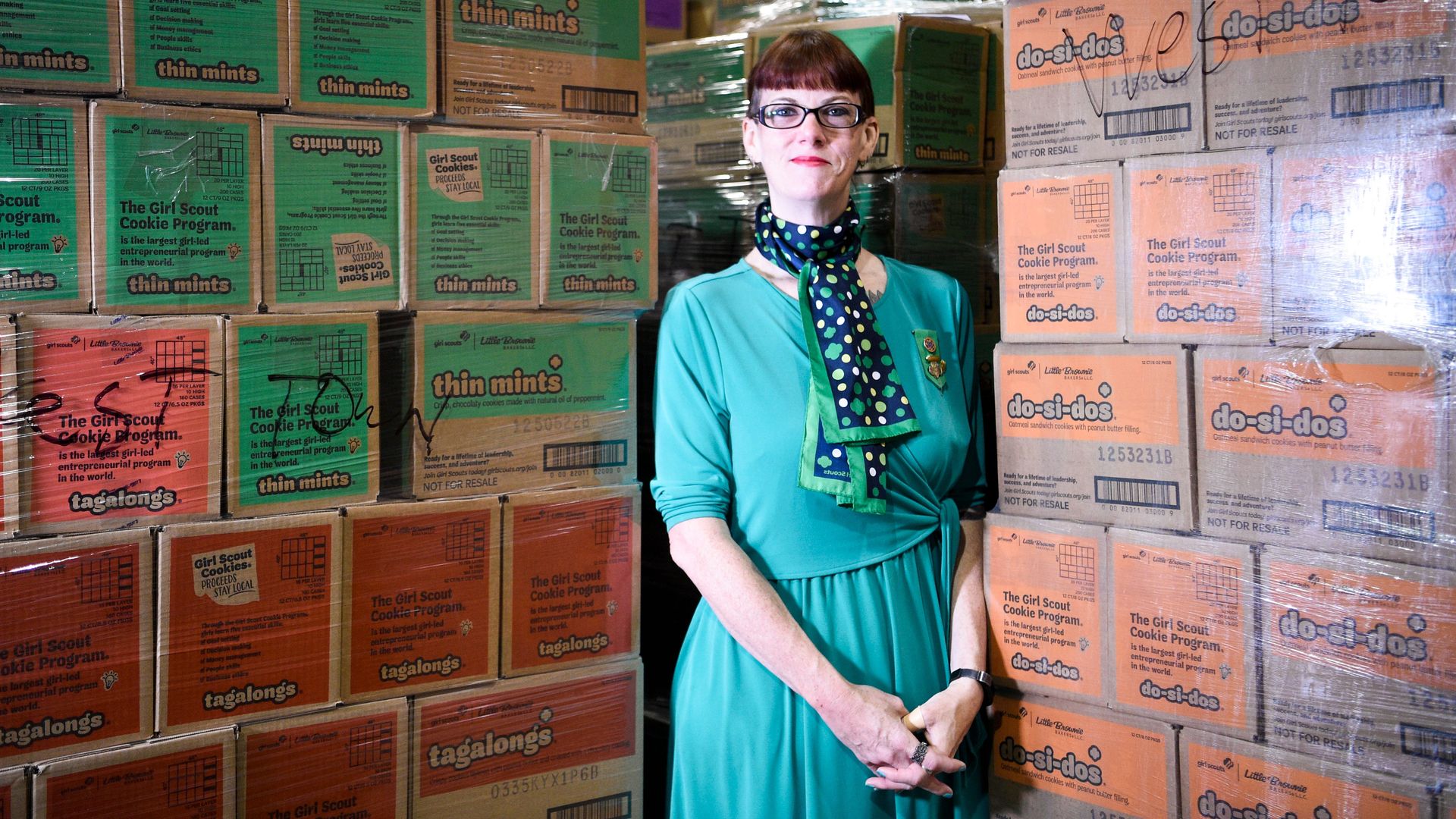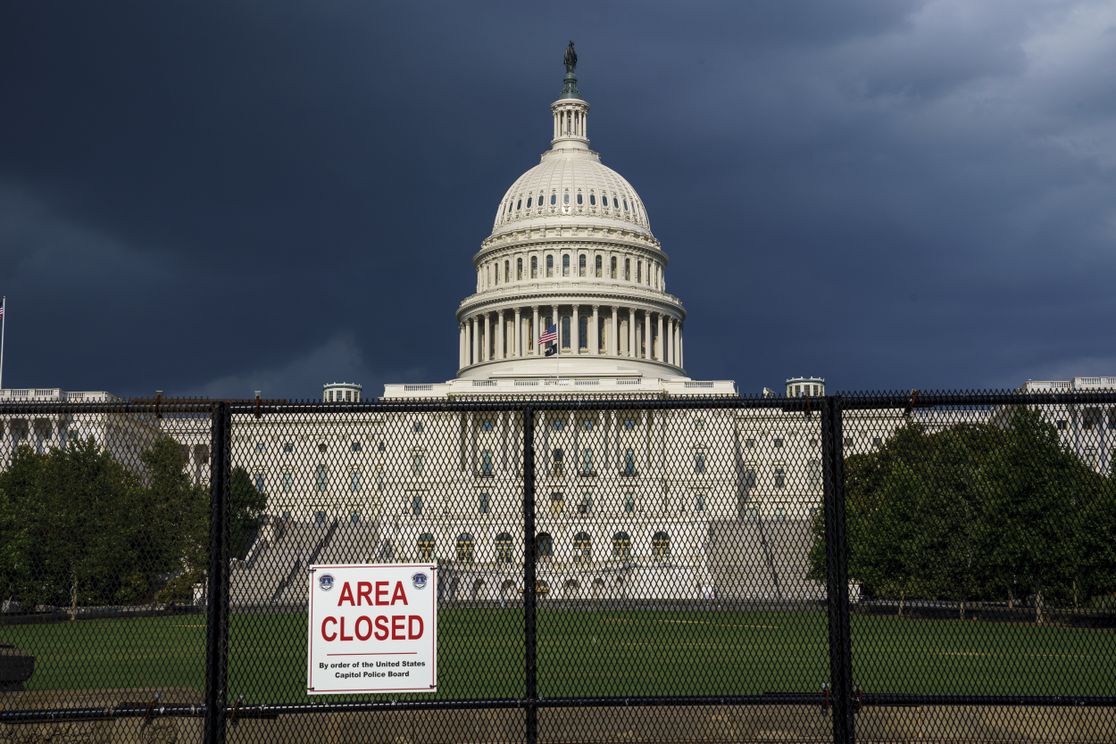| | | | | | | Presented By Mastercard | | | | Axios AM | | By Mike Allen ·Jun 15, 2021 | | Good Tuesday morning! Smart Brevity™ count: 1,462 words ... 5½ minutes. | | | | | | 1 big thing: Dirty jobs of the future |  | | | Illustration: Sarah Grillo/Axios | | | | President Biden's clean, green, connected world will require dirty, dangerous work to build, Axios' Kim Hart writes. - The catch: There's high demand for these jobs, but it's harder than you might think to find people who want to do them.
Some of the jobs building the future: - Tower climbers: The installers of wireless antennas for cell-phone networks and broadcast TV transmitters often clamber up to 2,000 feet above the ground while navigating electrical hazards.
- Solar equipment installers: The solar industry will need to quadruple its workforce — to a total of 900,000 workers — to meet President Biden's 2035 clean energy target, the Solar Energy Industries Association estimates.
- Fiber-optic cable layers: Biden's plan to get broadband to every U.S. home depends on quickly laying fiber-optic cables in unserved areas. That means thousands and thousands of miles of trenches will need to be dug in rugged terrain, remote areas and near busy roads.
🔮 This is a sneak peek from our new weekday newsletter, Axios What's Next, tracking the emerging ways we live, work and move. Sign up here. |     | | | | | | 2. NATO extends defense pact to space | | Leaders arrive at NAT0 headquarters in Brussels yesterday. Photo: Brendan Smialowski/AFP via Getty Images The communiqué from NATO's Brussels Summit recognized "the growing importance of space for the security and prosperity of our nations and for NATO's deterrence and defense.": - "[A]ttacks to, from, or within space present a clear challenge to the security of the Alliance ... Such attacks could lead to the invocation of Article 5" — NATO members' collective-defense agreement.
Why it matters: This was NATO member states' first formal agreement that space attacks could be as damaging as conventional attacks, The Times of London notes (subscription). |     | | | | | | 3. House antitrust bills are already outdated |  | | | Illustration: Sarah Grillo/Axios | | | | The sweeping antitrust bills House lawmakers introduced Friday don't just propose broad new principles of digital-age competition — they put giant bullseyes on the backs of the tech giants, Axios' Ashley Gold, Margaret Harding McGill and Scott Rosenberg report. - Why it matters: Laws crafted now to tie the hands of today's dominant companies will still be on the books for years and decades to come. Critics are already flagging possible unintended consequences.
The new bills apply to companies that have a market capitalization of $600 billion or more, and at least 50 million monthly active U.S. users or 100,000 monthly active U.S. business users. - That's most clearly Apple, Amazon, Facebook and Google. Some aspects of the bills could apply to Microsoft.
But today's definition of a "giant tech company" may become meaningless in short order. - "Monthly active users," a term of recent vintage and with varying definitions, could easily lose its usefulness as a measure of popularity.
- Over time, the $600 billion market cap limit could also end up covering many more companies.
Our thought bubble: The House bills are backward-looking, aiming to solve problems created by the rise to dominance of today's giants. |     | | | | | | A message from Mastercard | | Mastercard commits nearly $100 million to COVID-19 health response | | |  | | | | Mastercard is working to drive an inclusive recovery for a future where we all can safely get closer together. What this means: Through partnerships, funding, technology and collective action, Mastercard is supporting the rebuilding of healthy communities around the world. Learn more. | | | | | | 4. Axios first person: Surprise in "self-driving" driver's seat |  | | | 2021 Cadillac Escalade with Super Cruise technology allows hands-free highway driving. Photo: GM | | | | Assisted-driving features are supposed to make cars safer and relieve some of the monotony of driving. But your robot sidekick's driving style may not match your own, Axios' Joann Muller reports from Detroit. - Why it matters: Reliable, fully driverless cars are still a long way off. Until then, motorists will share driving duties with partially automated, assisted-driving systems.
Joann writes that she almost got into trouble on a Detroit freeway when the 2021 Cadillac Escalade she was driving turned out to be more polite (i.e., cautious) than she expected: - The Caddy was equipped with Enhanced Super Cruise, GM's hands-free highway driving system, rated safest by Consumer Reports.
I steered the Escalade to the center lane of I-94, switched on Super Cruise and relaxed, placing my hands in my lap. - A few minutes later, the Escalade unexpectedly slowed from 66 mph to 49 mph.
- Uncertain what was happening, and with cars swerving to pass me on the left, I grabbed the wheel and accelerated, automatically disengaging Super Cruise.
What happened: A driver in the right lane had been attempting to pass me on the right, but was prevented from doing so by a slower-moving vehicle in its own lane. - I, like most drivers, dismissed the out-of-luck aggressive driver. But the Caddy wanted to give him a wide berth.
GM engineers told me later that the Escalade likely sensed the other vehicle was too close to my lane, and slowed as a precaution. The Escalade behaved as designed. - But it was disconcerting because I didn't expect the car to be so polite. That's not how I drive!
The bottom line: People have different personalities behind the wheel. So do robots. |     | | | | | | 5. Media on the mend: Ads, hiring up |  Data: Challenger, Gray & Christmas. Chart: Andrew Witherspoon/Axios About 963 newsroom jobs have been lost so far this year — down 91% from the 10,576 cuts through the same period last year, Axios Media Trends expert Sara Fischer writes. - Why it matters: Other factors, like record ad growth and the speedy return of live events, suggest the media industry is rebounding quicker than anticipated.
New data from Challenger, Gray & Christmas suggests that while many media jobs are still being lost, hundreds are starting to be added. - So far this year, the media employers have announced 725 new hiring plans, compared to just 12 this time last year.
Advertising is exploding: Global ad spending is expected to grow by $78 billion in 2021 to $657 billion, an all-time high, according to a new mid-year forecast from advertising firm Magna. Between the lines: The adoption of new digital products — virtual events, e-commerce and online courses — has also pushed media companies and newsrooms to diversify their revenue. - Local newspapers continue to face headwinds as private investment firms look to consolidate local titles.
Share this story. |     | | | | | | 6. 📊 2 stats that matter | | Today's Wall Street Journal front page features two eye-opening stats as the economy emerges from lockdown: - Oil price hits pandemic high: "Some investors are wagering that Wall Street's preference for green energy will depress spending on oil extraction, setting the stage for supply shortages and higher fuel prices. ... U.S. crude prices hit $71.78 a barrel on Monday, their highest level in more than 2½ years." (Subscription)
- Corporate debate soared to $11 trillion, about half the size of the U.S. economy. The "torrent of inexpensive money," as interest rates plummeted, kept companies afloat but could endanger them in the next economic downturn. (Subscription)
|     | | | | | | 7. FBI warns of QAnon violence | | The U.S. Capitol, shown June 8, is still surrounded by fences. Photo: J. Scott Applewhite/AP An FBI threat assessment dated June 4 warns: "We assess that some [domestic violent extremists] adherents of QAnon likely will begin to believe they can no longer 'trust the plan' referenced in QAnon posts and that they have an obligation to change from serving as 'digital soldiers' towards engaging in real world violence — including harming perceived members of the "cabal" such as Democrats and other political opposition." - Why it matters: Followers of the conspiracy theory were visible at Trump rallies, and were part of the mob that stormed the Capitol. The intelligence report shows the movement hasn't died down.
Go deeper: Read the assessment. ⚡️ Breaking: President Biden this morning announced a National Strategy for Countering Domestic Terrorism, including: "The U.S. Government is improving employee screening to enhance methods for identifying domestic terrorists who might pose insider threats." |     | | | | | | 8. Bloomberg crowns Champion Cities |  | | | The Rochina favela in Rio de Janeiro, which became a Bloomberg finalist for a plan to use mapping technology to improve housing conditions in favelas. Photo: Fabio Teixeira/NurPhoto via Getty Images | | | | Bloomberg Philanthropies today unveiled 50 innovative Champion Cities that will advance to the final round of the 2021 Global Mayors Challenge, Axios' Bryan Walsh writes. - U.S. cities zeroed in on racial justice and equity. Social inclusion was a major theme in Europe. Raw infrastructure topped concerns in fast-growing African cities.
The U.S. winners: - Akron, Ohio: Taking lessons from training medical students to support Black entrepreneurs.
- Baltimore: Citywide system to support Black-owned businesses.
- Birmingham, Ala.: Investing in next-generation of food entrepreneurs.
- Columbus, Ohio: Last-mile Wi-Fi access to underserved neighborhoods.
- Durham, N.C.: Team to help residents access untapped federal resources.
- Lansing, Mich.: Partnerships to halt learning loss in children.
- Long Beach, Calif.: Bringing transparency to the gig economy.
- Louisville: Creating diverse tech workforce.
- New Orleans: Bringing trust-building lens to the delivery of public services.
- Newark: Reducing crime by focusing on the most persistent offenders.
- Paterson, N.J: Providing on-demand treatment to those struggling with opioid addiction.
- Phoenix: "Career mobility units" for job-seekers.
- Rochester, Minn.: Creating pathways for women of color into the growing, high-paying local construction field.
- San Jose, Calif.: Bolstering college-support pipeline for marginalized families.
Go deeper: See the full list. ... Share this story. |     | | | | | | 9. Melinda French Gates meets with Biden, Hill officials |  | | | Melinda French Gates speaks during SXSW Online in March. Photo: SXSW via Getty Images | | | | Melinda French Gates is staying visible with a Washington swing this week to visit White House and Hill officials to discuss issues important to her, especially paid leave, advisers tell me. - French Gates met at the White House yesterday with Chief of Staff Ron Klain and Domestic Policy Adviser Susan Rice, among other senior administration officials. French Gates and her organization, Pivotal Ventures, have been longtime advocates for policies that are part of President Biden's infrastructure proposal, including paid leave and child care.
- French Gates is expected to meet with senators on Capitol Hill this morning, including Sen. Patty Murray of Washington, the philanthropist's home state.
Zoom out: Last week, French Gates joined the Democratic Women's Caucus to virtually kick off a meeting with remarks focused on caregiving, paid leave, and women's economic empowerment. |     | | | | | | 10. Girl Scouts have millions of unsold cookies |  | | | Sandy Hubbell, director of product programs for Girl Scouts of the Southern Appalachians, in a cookie warehouse in Knoxville, Tenn., in April. Photo: Caitie McMekin/Knoxville News Sentinel via Reuters | | | | Girl Scouts have 15 million boxes of unsold cookies after the pandemic curtailed the spring selling season, with many troops nixing cookie booths for safety reasons, AP's Dee-Ann Durbin reports. - Girl Scouts normally sell around 200 million boxes of cookies per year, or around $800 million worth.
Around 12 million boxes remain with the two bakers, Louisville-based Little Brownie Bakers and ABC Bakers in Brownsburg, Ind. Another 3 million boxes are in the hands of the Girl Scout councils, which are scrambling to sell or donate them. The cookies have a 12-month shelf life. |     | | | | | | A message from Mastercard | | How Mastercard is supporting Latin America during COVID-19 | | |  | | | | Mastercard and its partners are working to combat food insecurity and deliver health resources across Latin America. Among its efforts the company has: - Committed to 10 million meals with World Vision and others.
- Donated 57 ventilators to the neediest state hospitals in Mexico.
Learn more. | | | | 📬 Thanks for reading! Please invite your friends, family, colleagues to sign up here for Axios AM and Axios PM. |  | | The tool and templates you need for more engaging team updates. | | | |














No comments:
Post a Comment